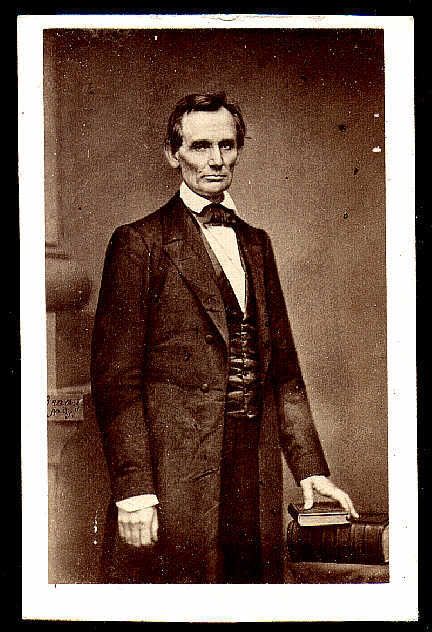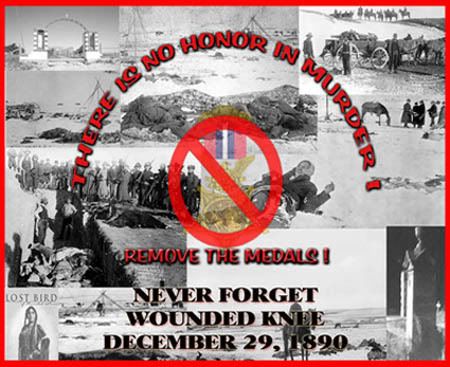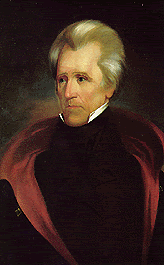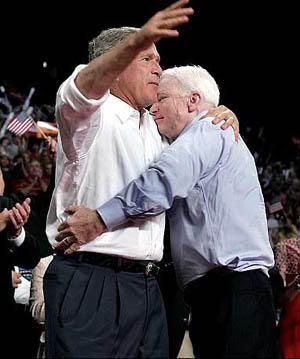by iampunha | 7/31/2008 08:00:00 AM
In the pantheon of meticulously conceived slogans and phrases that capture little of the complexity of the issues they're meant to sell, one stands above them all.
Sure, we may roll our eyes at pro-life (because obviously anyone who supports abortion enjoys the thought of death) or family values (which destroy families and devalue people) or the death tax (which taxes rich dead people's estates, not every now-dead organism).
But these are relatively innocent. They do describe some small element of the concepts they shield from public view. People who are pro-life are indeed pro-unborn child (just not often so very enthusiastic about protecting that life once it's screaming for food). People who support family values also occasionally support valuing families on more tangible matters, like education and public safety.
Die Endlösung, on the other hand, assumes mountains of facts not in evidence, assumes assertions A, B and C about them, and completes the travesty of logic by proposing an end game with those facts and assertions taken as such.
Its entire foundation is built of the same things we fight around the world 67 years later: scapegoatism, fear and disenfranchisement by labeling.
Die Endlösung may not have ended as its inventor intended, but it was pretty successful, offing 6 million Jews and 5 million others, in addition to the battlefield casualties.
And on July 31, 1941, Hermann Göring, acting on instruction from Adolf Hitler, ordered Reinhard Heydrich to come up with it.
For Antoine de Saint-Exupery, who joined millions in rejected Hitler's Final Solution.
I have written reasonably extensively (for a storyteller, at least) on the horrors of World War II, particularly for civilians. Partly because of that, and partly because yesterday's entry was rather trying, I'm going to approach today's topic from an academic perspective.
A friend of mine has designs on getting his doctorate in the rhetoric of censorship. I find the subject fascinating; indeed, growing up intellectually in the shadow of the Bush administration, it is hard to not be fascinated by the degree to which people will manipulate and outright rape language to suit their fancy, whether it be scaring, cajoling or lying.
This is not going to be a case study in how the Bush administration has lied in its creative use of language, nor even more than a casual look at how the RNC (ain't nothin' grand about it) has done the same through its metaphysical purchase of words like liberal, pro-life and pro-family.
Instead, this is going to be perhaps my shortest entry ever, because I have something very simple, and potentially surprising to tell you:
Hitler had a very good reason to believe language captivated people.
His native dialect, and his native vocal mannerisms, were nothing like how he presented himself in public.
This much should not surprise. We effect certain changes in our voices, subconsciously or otherwise, when we speak before substantive audiences. Our intonations necessarily move deeper in our chests because the resonance necessary for our words to come off as more than enthusiastic squeaks requires as much. Look at the pitch employed by whales as proof enough of that; their songs can travel miles underwater.
What made Hitler different is that his native dialect was gutter German:
There is nothing objectively wrong with using a nonprestige form of German — or English. Linguistically speaking, all dialects are created equal. (Those who find fault with Ebonics, with patois and with other forms of supposedly inferior language tend to bitterly fight the notion that Chaucer was writing in a thoroughly common tongue back in the day. If you were conducting official business with the crown or court, at no point were you ever using English — except to quote someone stupid or as a joke.)
But socially, of course, some dialects are more valuable than others. I was raised to speak and write in Upper Midlands, and pretty thoroughly so. (Fortunately, my parents do not mind so much that having gotten pretty good at UM, I revert back to other dialects from time to time an' a' tha'.) For whatever reason — and I'm not sufficiently familiar with him to offer a good non-WAG as to why — Hitler found more power in using a higher form of German than what he was obviously raised speaking.
This understanding of the value and power of language, whether regarding dialects of phrase selection, was pretty obviously conscious, judging by Hitler's speeches and by his use of language down to other plans for killing people:
See, Operation T4 doesn't sound like anything remarkable. (While I do not mean to draw meaningful comparisons here, the Heritage Institute, the American Family Association and Freedom's Watch sound pretty good and pure, and I'd argue they're anything but.) But once you get behind what Operation T4 is hiding, the generic-looking name reveals sinister plans. The same concept was adopted in naming the U-2 and the concept continued pretty interestingly throughout.
I just wish some other efforts to sell the public on things we really shouldn't have wanted had been a little more transparent.
Sure, we may roll our eyes at pro-life (because obviously anyone who supports abortion enjoys the thought of death) or family values (which destroy families and devalue people) or the death tax (which taxes rich dead people's estates, not every now-dead organism).
But these are relatively innocent. They do describe some small element of the concepts they shield from public view. People who are pro-life are indeed pro-unborn child (just not often so very enthusiastic about protecting that life once it's screaming for food). People who support family values also occasionally support valuing families on more tangible matters, like education and public safety.
Die Endlösung, on the other hand, assumes mountains of facts not in evidence, assumes assertions A, B and C about them, and completes the travesty of logic by proposing an end game with those facts and assertions taken as such.
Its entire foundation is built of the same things we fight around the world 67 years later: scapegoatism, fear and disenfranchisement by labeling.
Die Endlösung may not have ended as its inventor intended, but it was pretty successful, offing 6 million Jews and 5 million others, in addition to the battlefield casualties.
And on July 31, 1941, Hermann Göring, acting on instruction from Adolf Hitler, ordered Reinhard Heydrich to come up with it.
For Antoine de Saint-Exupery, who joined millions in rejected Hitler's Final Solution.
I have written reasonably extensively (for a storyteller, at least) on the horrors of World War II, particularly for civilians. Partly because of that, and partly because yesterday's entry was rather trying, I'm going to approach today's topic from an academic perspective.
A friend of mine has designs on getting his doctorate in the rhetoric of censorship. I find the subject fascinating; indeed, growing up intellectually in the shadow of the Bush administration, it is hard to not be fascinated by the degree to which people will manipulate and outright rape language to suit their fancy, whether it be scaring, cajoling or lying.
This is not going to be a case study in how the Bush administration has lied in its creative use of language, nor even more than a casual look at how the RNC (ain't nothin' grand about it) has done the same through its metaphysical purchase of words like liberal, pro-life and pro-family.
Instead, this is going to be perhaps my shortest entry ever, because I have something very simple, and potentially surprising to tell you:
Hitler had a very good reason to believe language captivated people.
His native dialect, and his native vocal mannerisms, were nothing like how he presented himself in public.
This much should not surprise. We effect certain changes in our voices, subconsciously or otherwise, when we speak before substantive audiences. Our intonations necessarily move deeper in our chests because the resonance necessary for our words to come off as more than enthusiastic squeaks requires as much. Look at the pitch employed by whales as proof enough of that; their songs can travel miles underwater.
What made Hitler different is that his native dialect was gutter German:
Journalist Jürgen Schielke transcribed the words on the tape, and it was also translated into Finnish. Schielke was surprised at the "working class language" used by Hitler and his turns of phrase which reflect the speaker's educational shortcomings.
There is nothing objectively wrong with using a nonprestige form of German — or English. Linguistically speaking, all dialects are created equal. (Those who find fault with Ebonics, with patois and with other forms of supposedly inferior language tend to bitterly fight the notion that Chaucer was writing in a thoroughly common tongue back in the day. If you were conducting official business with the crown or court, at no point were you ever using English — except to quote someone stupid or as a joke.)
But socially, of course, some dialects are more valuable than others. I was raised to speak and write in Upper Midlands, and pretty thoroughly so. (Fortunately, my parents do not mind so much that having gotten pretty good at UM, I revert back to other dialects from time to time an' a' tha'.) For whatever reason — and I'm not sufficiently familiar with him to offer a good non-WAG as to why — Hitler found more power in using a higher form of German than what he was obviously raised speaking.
This understanding of the value and power of language, whether regarding dialects of phrase selection, was pretty obviously conscious, judging by Hitler's speeches and by his use of language down to other plans for killing people:
In 1939, a Nazi "euthanasia program" began. This term is used as a euphemism for the Nazi plan to murder those with physical or mental defects. Unlike the sterilization program, the "euthanasia" program was conducted in secrecy. "Operation T4" was the code term used to designate this killing project.
As word leaked out about the "euthanasia" program, some church leaders, parents of victims, physicians, and judges protested the killings. Hitler ordered the end of Operation T4 in August 1941. However, the murders continued in a decentralized manner. Doctors were encouraged to kill patients with disabilities by starvation, poisoning, or injection.
See, Operation T4 doesn't sound like anything remarkable. (While I do not mean to draw meaningful comparisons here, the Heritage Institute, the American Family Association and Freedom's Watch sound pretty good and pure, and I'd argue they're anything but.) But once you get behind what Operation T4 is hiding, the generic-looking name reveals sinister plans. The same concept was adopted in naming the U-2 and the concept continued pretty interestingly throughout.
I just wish some other efforts to sell the public on things we really shouldn't have wanted had been a little more transparent.
Labels: iampunha





 On the other hand, here's a thought: If Obama
On the other hand, here's a thought: If Obama 


